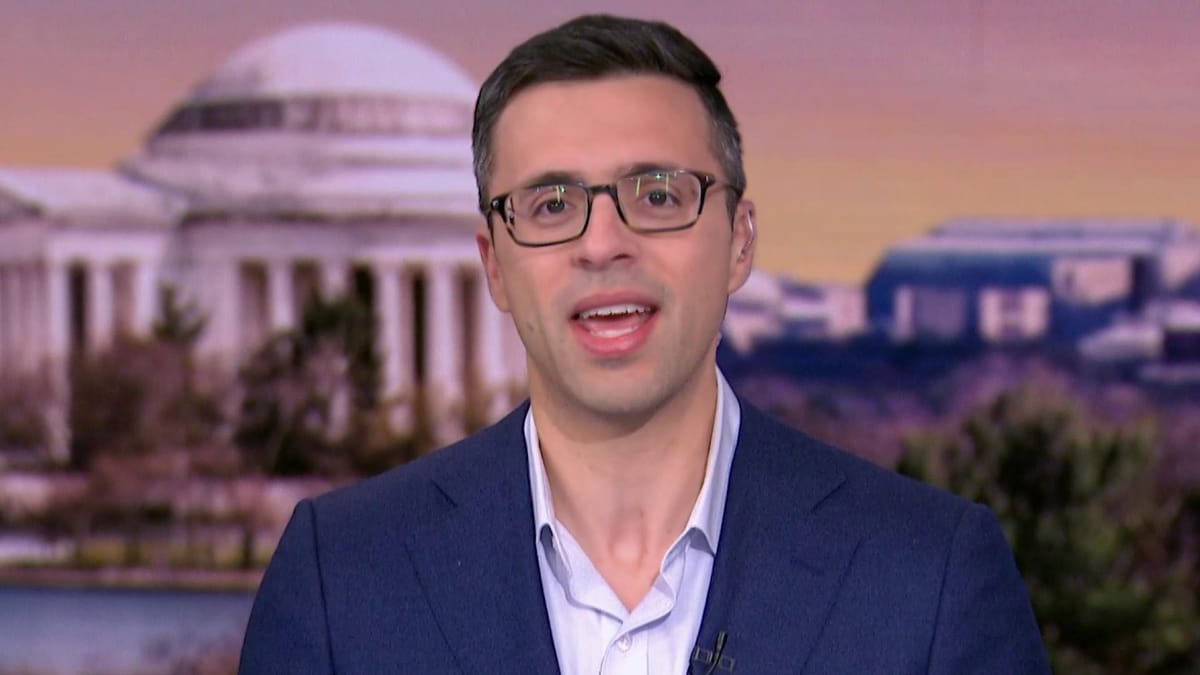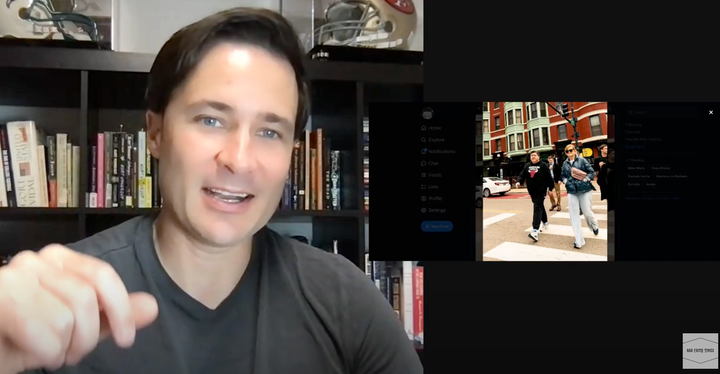The 'Abundance Agenda,' Torpedo Bats, And The Limits Of Reflexivity
The left can't be defined by only talking about complex solutions to complex problems

Today's BFT newsletter is from Andy Elrick, the director of the Center for Sports Communication and a professor of sports communication at Marist University. You can find Andy on Bluesky, the only legitimate microblogging platform. His newsletter, Bimbo Coles' Escape Room, can be found here.
In January 2017 I was awaiting the birth of my son and contemplating two inconceivable realities: He would be born into a world in which Golden Girls punchline Donald Trump had recently been elected president of the United States, and the Chicago Cubs were World Series Champions.
The second of those two incomprehensible scenarios I had been living with as a sort of negative space in my life for close to 40 years. Since roughly 1980 the Cubs had, to varying degrees, been a constant source of anxiety and derangement in my life. Mostly they just stunk, but even when they managed to put together a decent season, like 1984 or 2003, the outcomes had left me ever more traumatized. Still, there was no getting away from the fact that when the season started, they were one of 26 (later 30) teams with at least a theoretical chance of winning a championship.
Donald Trump as president, meanwhile, didn’t even seem metaphysically possible. It felt like the Dolphins winning the World Series.
Subscribe to Bad Faith Times for free or become a supporter and join the BFT discord community
What I knew of Trump at that time consisted of a vague sense of him as an avatar of the insipid Reagan-era success culture of the 1980s. Like a duller, cheesier version of Gordon Gekko, he wasn’t so much a captain of industry as an actor playing one, in sequels of popular films (Home Alone II), sitcoms (The Fresh Prince of Bel Air) and finally his own reality TV show The Apprentice, in which he portrayed a jumped-up version of a boss.
My first memory of him was as a rich guy who was getting divorced again. As I understood it at the time, divorce was a private affair, something not discussed in polite company, but only in hushed tones at the back of a PTA meeting. Trump’s divorces, though, were covered in detail by my grandfather’s paper of record, the New York Daily News. I loved the Daily News because I loved my grandfather, and they loved Donald Trump, who always seemed to be featured strutting out of a midtown steakhouse under a snarky headline referencing some feud or another in which he was ensnared.

Then and now, this isn’t the kind of content I typically go for, but as an adolescent New York City and its environs (especially the parts of North Jersey where my mother’s family lived) exerted a sort of mystical hold over me. They looked, sounded and smelled so different than where I lived, but more so even than that they just had so much more of everything than we did. In my Vermont town there were two malls, a single lonely newspaper, and zero (as far as I was aware) rich blowhards whose marriages imploded in increasingly arresting and public ways. Growing up in a place where very little happened, I suppose there might have been some appeal to a character as outrageous as Trump.
Decades later my perspective was less clouded by callowness and naïveté and so my judgement of his political project swifter and unequivocal. I never cared much for him, but once it became clear he could be president that antipathy curdled into the sort of ambient existential dread that we now call, you know, life.
By October 2016 the Cubs were marching through the playoffs, a welcome distraction from the coming catastrophe, and I found myself supplementing the anxiety abating qualities of the contemporary game with pure nostalgia. I scoured eBay for sets of baseball cards nobody but a weirdo like me could possibly want, and once they arrived, shuckled over them like a Hasidic man might the Torah. My wife, extravagantly pregnant by this point, cast concerned glances my way as I sat at the kitchen table muttering the names of long forgotten ballplayers whose lavish mustaches and ruddy complexions recalled a man selling a used chest freezer on Facebook Marketplace.
Looking at a photo of Dave Stieb lowered my blood pressure, even if I felt certain that the former Blue Jay's politics did not align with my own.
Once Trump had been inaugurated—the buzz of the Cubs triumph already fading into history, and my eBay budget exhausted—we were faced with the stark reality of parenting for the first time as the world burned. Placing the practical realities to the side while we waited for our baby’s arrival, we instead spent our evenings workshopping names for our bundle of joy. Fully and enthusiastically wallowing in the #resistance culture of the moment we decided the middle name would be a marker of the political moment, a protest if you will. Amway heiress Betsy Devos had just been named Secretary of Education, and my wife had graduated from Columbia’s Teachers College nine months earlier, a milestone she had celebrated by (as tradition dictates) rubbing the head of the bust of John Dewey that sits prominently at the entrance of the school. Dewey—a long time member of the TC faculty, champion of public education and arguably the most prominent intellectual of the first half to the 20th century—was also, like our baby, a Vermonter.
Our son’s middle name would be Dewey.
This daring bit of political subterfuge (naming our infant son after a long dead academic) didn’t have the lasting impact we had hoped it would. After a short reprieve, Trump has of course returned to the White House and he’s really feeling himself. He even has a buddy this time. In an especially dispiriting flourish, Devos has been replaced by professional wrestling scion Linda McMahon, whose experience in education amounts to a tepid endorsement from academically regaled WWF heel Lanny “The Genius” Poffo ahead of her failed 2010 Senate run.

And so, an enduring and actionable plan for wresting control of our nation back from a political project animated entirely by cruelty, and fixated on the testosterone levels of Mountain West women’s volleyball players has proved elusive. My Dewey is now eight, a Cubs fan himself, and things have only gotten worse. If not for the Cubs (they are in first place in the National League Central after all), then certainly for the country.
Most worryingly, the ideological and political cohort meant to oppose Trump seem unable to craft a coherent messaging strategy, one that appeals to the part of the American voting public that isn’t slavishly on board with team crash the economy and rendition your neighbor to a private prison in El Salvador. It’s not that Democrats have no ideas exactly, it’s just that most of them are bad or entirely insufficient to the times, and more importantly, they can’t sell them.
The pundit arm of the Democratic Party isn’t faring much better I’m afraid, and I sometimes fear Dewey (the philosopher, not my son) has played some small part in that.
To be clear, John Dewey would not be cool with any of this. He wrote a lot, about a lot of things, but is best known as a philosopher of education, and beyond that the crucial role it plays in the maintenance of a healthy democracy, as opposed to the one we have. Dewey is buried walking distance from my home, on the campus of his alma mater the University of Vermont. Is he spinning in that grave right now? I’m not even sure spinning is the word for it. Cast your mind back to high school wood shop. Remember the lathe?
The man was nothing if not prolific, and while I will not pretend to be a scholar of his work, my own approach to teaching is heavily informed by two of his most important insights: That learning is experiential and reflexive. Students learn best by doing and then reflecting on that doing. “The function of reflection,” wrote Dewey in his 1910 book How We Think, “is to bring about a new situation in which the difficulty is resolved, the confusion cleared away, the trouble smoothed out, the question it puts answered.”
This was a principle mostly meant to be applied to the educational process itself, but I think it’s safe to say that reflexivity can also be seen as a virtue coveted by liberals more broadly. Part of being a virtuous liberal is demonstrating a willingness to own up to one’s mistakes or missteps and do better.
Case in point: Ezra Klein.
Ezra Klein vs. Bernie Sanders: A Clash Of Progressive Messaging
I want to be clear on two points here. One is that I have not read Klein’s new book Abundance (co-authored by The Atlantic’s Derek Thompson), but I’m not sure you have to, given the sheer volume of podcast appearances the authors are making. Secondly, I kind of like Klein. He’s smart, well-spoken, and maybe most appealingly, reflexive. Klein is without doubt “a liberal,” but he’s the kind of liberal who relishes above all else a wonky white paper approach to policy paired with a healthy dose of introspection. In his titular New York Times podcast, he offers critiques of both the right and the left delivered as ASMR. He never yells or gets too exercised about anything, does his research, and evinces a thoughtful evenhandedness that no doubt appeals to his audience. This includes me.
Klein is also, in my view, the living embodiment of the Robert Frost quip that a liberal is a man too broadminded to take his own side in an argument.
One of the main theses of Abundance is that policy makers in states run by Democrats have been unwilling to face up to their own shortcomings in addressing a variety of issues, one of the most acute being a shortage of housing. If we’re going to bring down the cost of living in blue states then we need to build more homes, and Klein and Thompson suggest that what’s keeping that from happening are the kinds of regulations typically championed by elected Democrats and progressives.
“I am more worried about the inability of the people who believe what I believe to change the world in a way that makes people want that vision executed than I am about the other side,” Klein told fellow wonk Chris Hayes recently.

It probably goes without saying at this point that I am not. I’m most worried about the people plucking legal residents of the United States off the street and sending them to prisons without even a nod to due process. If we want to reflect on the profligate ways in which the Democratic Party has failed their constituents over the past 40 years that’s to be encouraged, but as a matter of political messaging, I would suggest it’s poison.
To be clear Klein and Thompson are offering solutions, but they seem to me to be secondary in the discourse to the part where they admit to all of progressivism’s shortcomings. The Abundance book tour has, of course, included visits with likeminded libs like the Pod Save America boys, but Thompson and Klein have also appeared with Lex Fridman, Ben Shapiro, and Bari Weiss, indulging that liberal kink for engaging with their ideological enemies, no matter how bad faith. In Klein’s world you get extra credit for engaging with the far right in good faith, in the real world you get a second Trump term.
Klein’s approach—maybe best exemplified within the Democratic establishment itself by debate team captain Pete Buttigieg—resonates with influential swaths of the base, but we know it’s not the only option. Bernie Sanders (another Vermonter) and Alexandria Ocasio-Cortez, for instance, have drawn big crowds to their rallies in the months since Trump’s inauguration. I’ve watched enough of them to know that Sanders and Cortez spend very little time wringing their hands over the shortcomings of democratic socialism.
Ezra Klein engaging with Ben Shapiro, a master of bad faith politics.
Sanders—at 83 almost certainly not our knight in shining armor—continues to be preternaturally focused on the two or three issues that preoccupy him. In my view what has made him such an enduringly popular political figure is that he has very much been “on that Bernie shit,” nonstop, for 50 years now. There’s no room for anything else, like the kind of public navel gazing valued by your average liberal.
What I mean to say is that Sanders—unbothered by a need to signal to other liberals, centrists, and maybe most importantly Republicans, an appropriate regard for self-interrogation—rarely puts himself or his political movement on the couch, analyzing its rhetorical or material pathologies to within an inch of their lives. I assume he may discuss these things in private, but it is certainly never central to his messaging.

His account of what ails us is not only sincere and accurate (Klein’s may be too) but simple; the people making your life worse are right there in front of you. Not faceless civil servants or 1970s progressives you’ve never heard of, but Jeff Bezos, Elon Musk, and Mark Zuckerberg. Bernie Sanders, a native of Brooklyn, has known who the enemy is since his beloved Dodgers skipped out for the coast, and he doesn’t mince words.
Which returns us to baseball, a sport long allergic to any kind of innovation that doesn’t involve Deep Heat in your jock strap or banging a trash can. Anyone who’s seen the film Moneyball knows how this has played out in the last few decades. Jonah Hill’s Klein-coded character Peter Brand, sitting sheepishly in the corner, while wizened scouts discuss “classic swings” and “ugly girlfriends.” The conflict that makes the film is between the stuffy conservatism of scouts and the progressive yearning of the analytics nerds. The nerds now run the show, their data-driven rationality overwhelming the baked-in conservative culture for which the game has always been known – so much so that we have learned in the opening weeks of this MLB season that there are now minor league hitting coordinators with degrees from MIT.
It turns out that while front offices have been taken over by slide rule wielding geeks whose job it is to find every underexploited efficiency available to them in building rosters and game models, the folks making the game’s most crucial accessory, bats, have been coasting on Eisenhower-era technology for the past fifty years. Apart from the type of wood used, not much has changed about bats in that time, but former Yankees and now Marlins coach David Leanhardt (the guy with the MIT degree) innovated in the space by doing something that would have gained John Dewey's approval. He asked questions. Namely, where are you making the most contact with the ball? The answer he got from players was, not surprisingly, the sweet spot. Leanhardt’s fundamental insight was in recognizing that weight could be redistributed to this part of the bat barrel to maximize the likelihood of making contact. The result is the “torpedo bat,” a reference to its oblong shape, which has taken the league, and maybe more importantly the discourse around it, by storm.
Young Dewey is aware of the new bat, of course, even if his grasp of Newtonian physics is fleeting. For him, as for most of us, it’s about more dingers, always a good thing. His favorite player, Cubs second baseman Nico Hoerner, appears to be using a torpedo bat, which makes it even more appealing. Hoerner, who went to Stanford, has offered some of the most cogent analysis of the bat and its future.
Still, it’s Hoerner’s job to use the bat, not talk about it, and maybe that’s where the limits of reflexivity – as a political messaging tool and an approach to hitting – reveal themselves. Klein is probably right when he suggests that we can have cheaper housing, better public transport and faster broadband if we can get out of our own way, but leaning into the kind of self-flagellation fetishized by liberals won’t get us there. If Ezra Klein wants to design us a new bat, that’s great, but whoever swings it needs to keep their eye in the ball.
Follow Andy Elrick on Bluesky at @andyelrick.bsky.social.







Comments ()